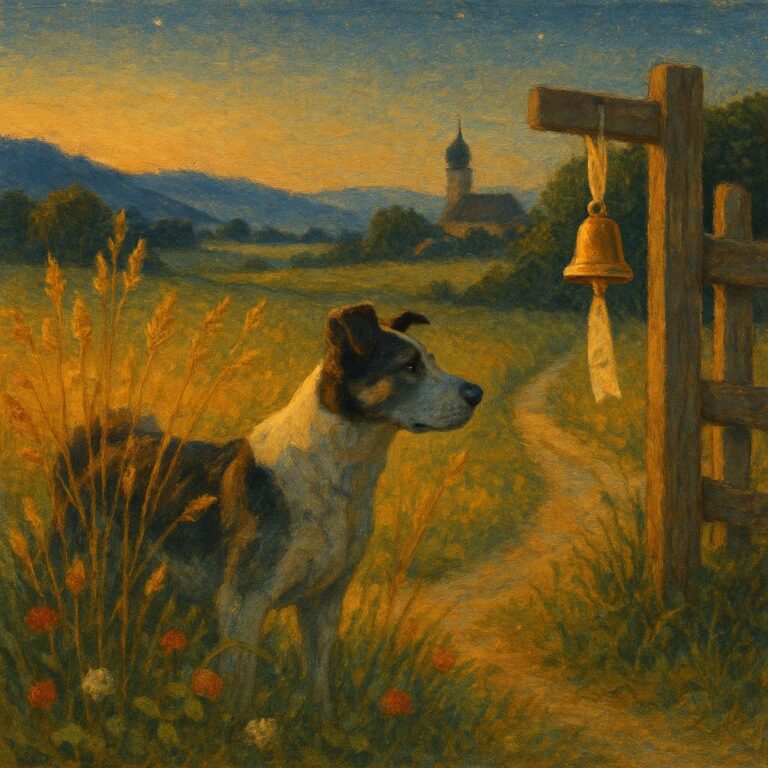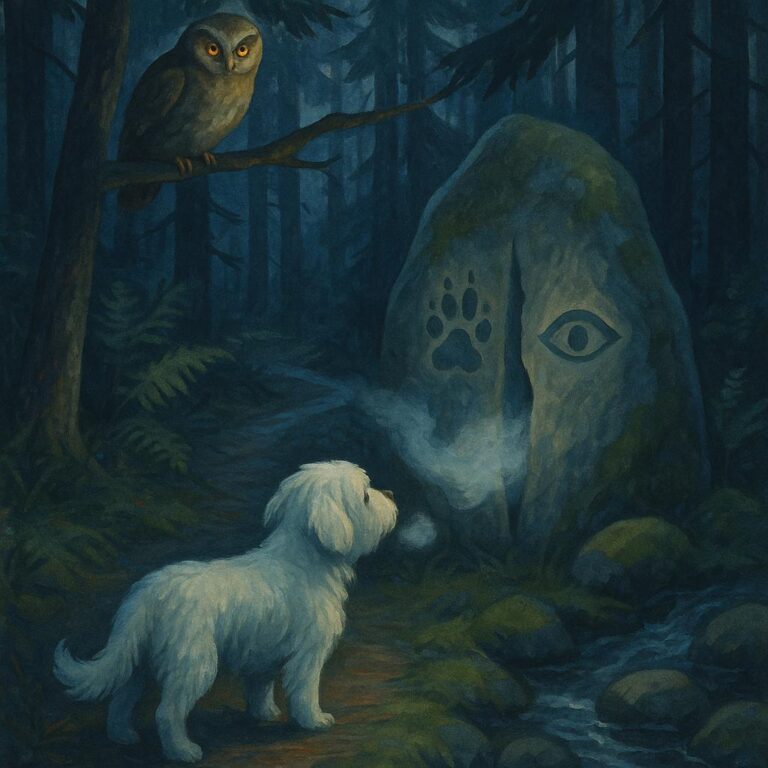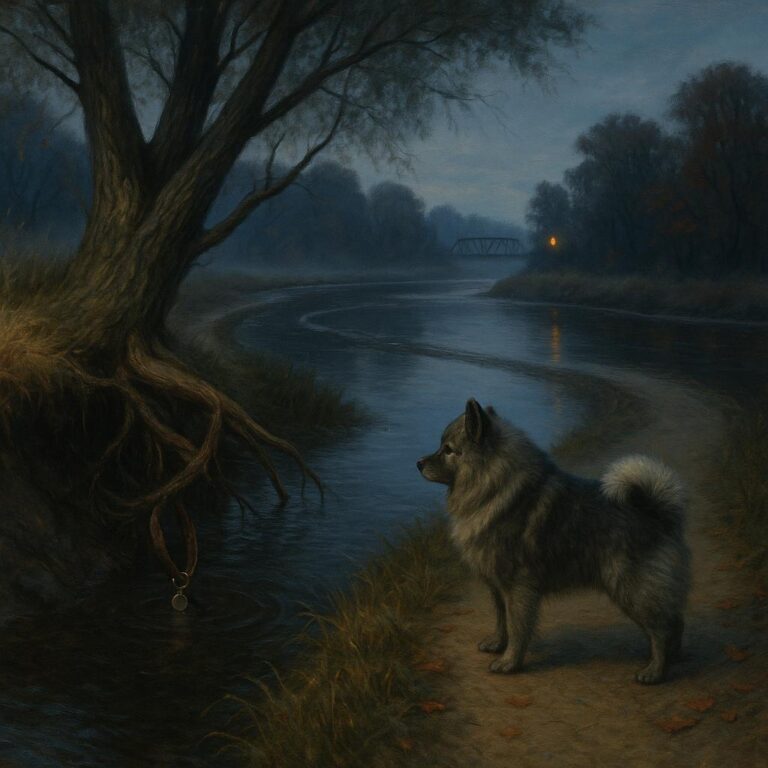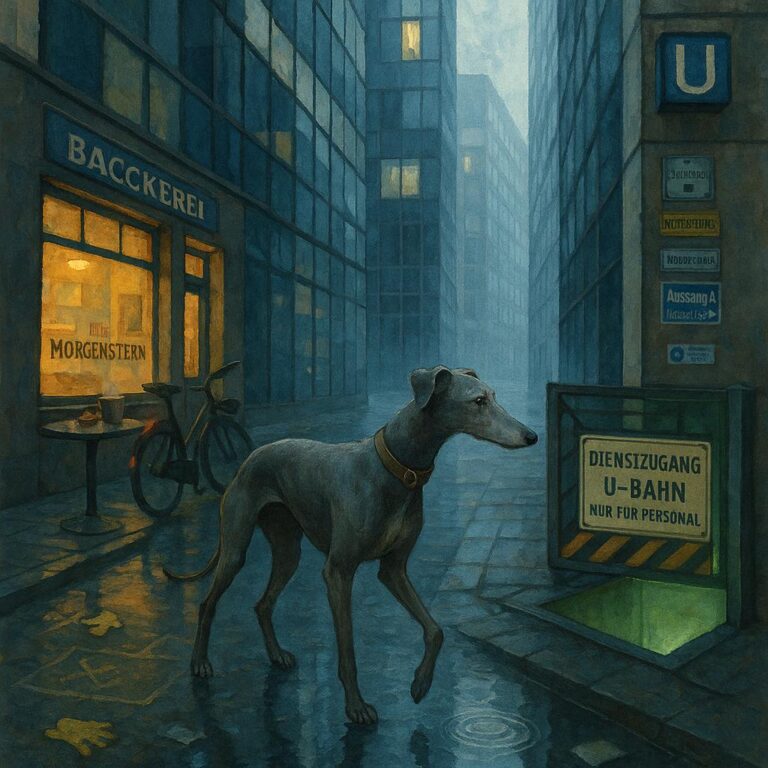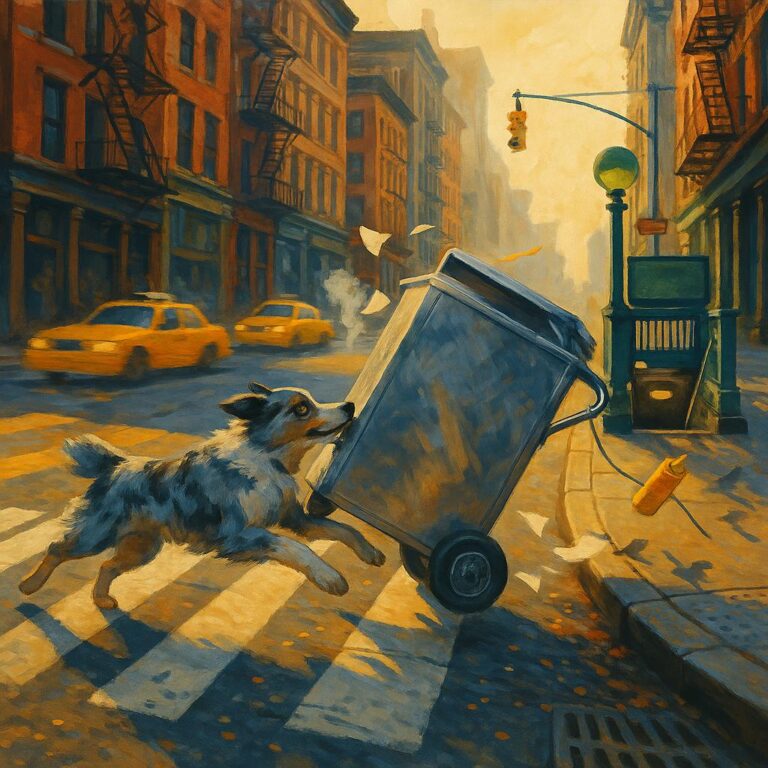Echoes Beneath the Cloister

From the cool cloister stones I speak, Koda the Keeshond, fourteen winters wise. I know why Brother Anselm hides his letters, why the swallows braid air above the bell. I taste secrets in the incense and hear prayers before they are spoken. The monastery keeps time. I keep watch.
Tonight, the bell rope shivers though no hand pulls. Footfalls multiply in corridors where only one novice walks. Beneath the refectory, the crypt door exhales dust and a scent older than rain rises. I pad closer, fur lifting, as a voice I have never heard and yet know breathes my name.
I lower my head to the door’s seam and breathe the breath of earth. Cold lime. Old beeswax sunk into oak. Iron where hands have rubbed ring and latch for years. Beneath it all, a damp sweetness like moss crushed in the dark. The voice comes again, close now, shaped like the pause between thunder and rain.
Koda.
I have been called good dog, gate shadow, hearth sleeper. I have been called away, come, hush. This name is different. It reaches from before the first bell I learned, from the time my mother’s heartbeat was the whole of time.
The corridor is a throat of stone. I pad, pads finding their old places between cracked flags, and the shivering rope makes a soft hiss against itself as if it were fur being licked smooth. The shadows multiply around the novice — Anselm, ink-smelled and lean, the boy who has learned to tuck the taste of tears behind the starch of his collar. He freezes when he sees me, his hand already to the key. He whispers a prayer that has no words, only breath. He thinks he is alone. He never is. I know where in the sacristy he hides his letters, folded into a hollow behind Saint Michael’s painted foot. I have nosed that hollow more than once and left it, because the paper breathes of smoke and river mud and a woman’s hair and something like rye. He hides the letters because he thinks vows must be a wall without doors. He hides them because he does not want the abbot to see his fear written in a hand steadier than his heart. He hides them fewer nights now, because drought has taught even the stubborn that a mouth drinks before a doctrine.
The key turns. The crypt exhales. Dust lifts in the lamplight and swarms like midges over a summer trough. The smell is older than rain: geosmin, the first perfume of the world when stone met water and changed its mind about hardness. It rolls over my tongue and says: find.
I take the steps with the slowness of age and the exactness of my youth. Anselm’s lamp makes gold plates of his fingernails. Bone boxes sleep along the walls, carved lids showing hands that no longer measure grain, lips that no longer say “peace” but keep it. Names are pressed into the stone in Latin that tastes like green walnuts. The voice comes from stone, from the mortar seam behind Saint Rufus’s coffin, from the thin place where the wall was skinned and patched with a different lime.
Here, it breathes. Koda.
I press my nose to the seam. My whiskers tick. The mortar is soft as stale bread. I paw. Dust sifts. The voice pours through, low as a cow in labor, patient as a millwheel. I bark once, short, the sound I use when a door has a person on its other side. Anselm jerks.
“What is it?” he asks, and his voice is boy and monk and son, all braided.
I paw again. Stone flakes. Behind us the rope whispers against itself. I look up the stairs, toward the place where the bell lives, iron and throat and sky. No one should be pulling it at this hour. No one is. It wants to speak.
I run. For all my winters, I am new again, the first run in snow. I climb, nails finding grip where shoes slide. I leap and catch the rope in my teeth. It tastes like palm and hemp and the salt of prayers. My jaw aches and I pull anyway, feeling the ache and offering it like bread. The bell answers. One great voice becomes two and then many as iron wakes stone, wakes wood, wakes sleeping men. Footfalls really do multiply now. Sandals slap. Board creaks. A cough. “Fire?” “Where?” “Where is the dog?”
Brother Anselm is last into the light from below, his lamp making a star at his hip. The abbot’s eyebrows come together and then apart again when he follows my no, this, this way down into the cool. The line of them goes like a single creature: lamp-bearers, shadow, breath. We pack tight into the crypt until the air tastes of wool and men and fear that has remembered its manners.
I go back to the seam. I lay my paw flat. I look up. Anselm understands. He sets the lamp down and fetches a chisel. The abbot mouths, “No,” then “Yes,” the second time softer, shaped like a plea. The chisel bites. Stone dust powders his cassock. Chips fall like hard petals. The seam cracks and from the crack a string of cold runs down my foreleg and pools at my toes. Dogs know seasons with skin. The first thread of water always runs faster up a leg than memory. I lick. It tastes like iron coins, like leaf-vein. It tastes like the old spring in the orchard that went dumb three summers ago.
“Saint’s mercy,” someone says. It is a prayer. It is a fact. The crack spits bright and the wall becomes a mouth and the mouth spills water.
It is not a flood at once, but a remembering. The stone that remembered its hardness also remembers that it can be weather. Drops become a rill, the rill a stream, the stream something that can be cupped. The novice puts his hands there and trembles, his laugh torn in half by a sob. The abbot kneels and the water makes dark coins of his knees. The sound fills the crypt until it is the only sound, and the bell above answers once more, as if it understands that the monastery has been given back a kind of time you can hear with your hands.
Anselm looks at me in the way men look at stars that have just slid out from a cloud. He is wet to the elbows. The letters in the hollow will be safe for now; I trust him to decide where they belong when dawn makes him braver. He reaches without looking and finds my ruff and we share breath. He smells of ink and lime and boy. He presses his face to my ear and whispers, “Thank you,” not to me alone.
They build a stone lip to tame the water’s mouth. They bring pots and bowls and laugh and argue softly about the founder’s design and whether the spring was sealed to keep the scriptorium dry or to make men penitent and attentive. By the second candle’s end, the whole crypt is humid with it. The damp climbs the walls like vines. Above, swallows begin their morning work, threading air, stitching sky to bell tower with their needle-bodies.
When Anselm goes up at last, he doesn’t hide his hands. He goes to the hollow behind Saint Michael’s painted foot with the quiet of a man setting down a burden and brings the letters out by daylight. He does not look around. He does not flinch when the abbot’s shadow crosses his shoulder. He breaks the seal of one and reads with a voice he has learned to trust: a prayer without right answers, for water, for release, for a way to love right things rightly. The abbot lays a hand on his neck and that is all.
The well they make from the spring is at first a stone trough and then a basin and then a place with a name. The brothers teach the city gate children to step there lightly, to listen to the voice the water has when it strikes bowl, when it licks ankle, when it takes a mouth and empties a throat. The women from the lower quarter come with jars balanced like crowns and carry away a clean that does not scold. The swallows dip and drink while flying. The bell seems less lonely.
I find that I sleep by the basin now. Old bones love the song it makes. The incense still rises; I still taste secrets in it, the minty ones and the bitter and the sweet. Brother Anselm writes still, but he hides less. He writes on smooth stones and leaves them under water sometimes, and I watch the ink dissolve and the words become something that no longer needs to be owned. When he prays, he does it out loud more, and I hear before he speaks not because I am clever but because the prayers now are made of things the world understands: bread. Water. Warmth. Forgiveness that tastes like the skin of apples.
Once in a while, after Compline, the rope shivers again without a hand. I lift my head. It is only the bell telling the wind what we know: that we are held. That there is a spring beneath our feet that the wall kept quiet until it could not. That watch is a kind of love.
I am fourteen winters wise. The fur around my muzzle has gone salt and more salt. My back legs are stiff on cold mornings, and a boy with newly shaved chin sometimes slips both arms under me and sets me down from the step as if I were bread from a shelf. I put my chin on the stone lip of the basin. The voice that called me here has grown soft, not gone. It hums through the water, through the wall, through the rope at my teeth that night, through the swallows’ work above us.
The monastery keeps time by bell and by water now. I keep watch. When the rope shivers, I will wake them. When the wall breathes, I will hear. Before a prayer is spoken, I will taste it on the air and know if it asks for thirst or for thanks. When my own breath grows small and even, I will set my muzzle down and know that the watch has been kept well, and that another will learn the corridors and the smells and the difference between danger and dream. The swallows will braid the wind, the bell will remember how to answer itself, and the spring will go on speaking in the only tongue that never lies.

